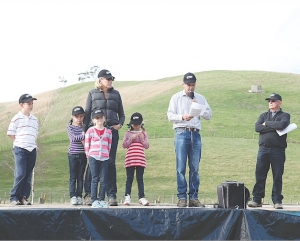Hugh Ritchie, managing director of Drumpeel Farms leads a farming operation that combines large-scale cropping (cereals, process vegetables and small seeds) with lamb and cattle finishing.
The agricultural farming company owned, directed and managed by the Ritchie family has expanded significantly in the past decade to include two main properties about 20km apart: Horonui and Drumpeel.
Ritchie, who prefers cropping to livestock, delegates the latter role to stock operations manager, Jason Daly.
“Jason runs his team and cropping manager, Mike Foster is my second-in-command. I set out the plan and leave them to it.” However, the integration of stock and cropping is pivotal and Ritchie keeps a keen eye on things.
“Communications with Jason and his team is critical as to how we manage that and we put a lot of time into it.”
He says they focus on what they can control which is cost and yield. “Whether we are growing grass or lambs and beef or crops, if we can keep our costs down and get our per hectare income and yield up then we are going to come out on top.”
Other economic strategies include spending money on technology that boosts productivity, such as GPS leveling systems on tractors and top of the line sprayers, but choosing to buy quality second-hand equipment and sharing cropping equipment.
They recently upgraded their silo complex. “We gain $20-$50 per ton on grain if we can hold it over and then sell it when not pressed by harvest conditions. Letting the market come up is a critical part of gaining strength.”
“We think there is still over a million dollars of gains we can make in this business and most of that will come by incremental gains in lifting our averages and working at all those little things.”
Ritchie’s father, David, began the combination of cropping and pastoral farming in the 1960s. In the late 1990s they began to irrigate 215ha at Drumpeel Road which brought new possibilities for cropping and procuring lambs.
Rylands Block, just out of Waipukurau, was leased in 2001, adding additional finishing and some cropping opportunity, but was dropped earlier this year because it was no longer required.
In 2006, Peka Peka, a 330ha property was purchased and not long after they bought Horonui Station (475 ha) which linked their land areas. They also lease a neighbouring 100 ha.
Wainui, adjoining Drumpeel, came on the market last year and was added to the holdings.
“This leaves us with a focused business in two locations: Horonui and Drumpeel, with livestock finishing, vegetable and cereal cropping the main focuses,” says Ritchie.
Ritchie won a Nuffield Scholarship in 2001 and spent time in the USA, UK, France and Asia where he studied minimum till management systems and irrigation efficiency. The result can be seen on the Ritchies’ farms today.
Making the decision to irrigate gave the family the confidence to start direct drilling. Crops are in five-year rotation: ryegrass, maize, squash, peas or beans, winter wheat, and back into ryegrass. It’s sustainable land management both for stock and cropping. Crops of maize, sweet corn and squash and beans are strip tilled. Peas, wheat barley, oats and ryegrass are direct drilled.
These establishment methods minimise the impact of machinery on paddocks and cut fuel and labour costs.
All process crops are contracted. Ritchie prides himself on having created very good relationships with customers such as McCain’s. “Three years ago they asked if we could grow carrots, so we put in a block and it went well.
“We are aware of what the dairy industry means and that’s why we are pushing to get cropping systems that match and meet dairy but with a lower capital requirement.”
Stock operations manager Daly says the management strategy for cattle and sheep is simple, with three key products: beef, lamb and wool. “We want high return livestock policies with low risk.”
Cattle run on non-arable cropping land only. The objective is to achieve average annual daily live weight of 1.0kg/day.
For 2013 season the average buy liveweight was 260kg and average sale weight was 650kg.
Lambs are bought at 33-35kg liveweight with a target 20kg liveweight gain to kill at 23-25kg carcass weight. Trading margin overall averages $50/head which equates to $2.50/kg

















